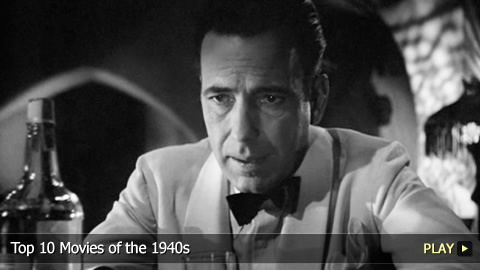Top 10 Movies of the 1940s

This decade saw Hollywood reflect the changes in society and technology in some landmark films. Welcome to WatchMojo.com, and today, in this installment of our series on the greatest movies of all time, we’re counting down our picks for the top 10 movies of the 1940s.
For our series of the Best Movies of All Time, we’ve chosen ten movies per decade based on their iconic status, critical acclaim, box-office success, and watchability. And just so you know, we’re not necessarily choosing the movies your film studies professor would pick.
So sit back and relax as we explore the highest highs and lowest lows of a tumultuous decade.
#10: “The Great Dictator” (1940)
Never one to shy away from controversy, Charlie Chaplin released this anti-Nazi film at the start of World War II. Satirizing Hitler and his regime, the movie follows a Jewish barber as he attempts to avoid imprisonment by Nazi troops. Though it was banned in some parts of Europe, “The Great Dictator” eventually earned millions at the box-office, nabbed five Oscar nominations and signaled Chaplin’s complete move to talking pictures.
#9: “The Treasure of the Sierra Madre” (1948)
No one ever said that being a gold prospector’s easy. And when it’s further complicated by distrustful partners and dangerous banditos, it can become downright life-threatening. Featuring Humphrey Bogart and Tim Holt as two penniless Americans looking for their fortune in Mexico, this John Huston adventure is a darkly humorous character study on greed and morality that won several Oscars and inspired countless filmmakers.
#8: “The Philadelphia Story” (1940)
This is less of a love triangle and more of a love square. Katharine Hepburn plays a socialite with more suitors than she can successfully manage, including her ex-husband played by Cary Grant. Cast to perfection, it’s a smartly written, classic romantic comedy that allowed audiences to reconnect with Hepburn as a star and kept the Hepburn/Grant machine moving, while also taking home two Academy Awards.
#7: “Fantasia” (1940)
This animated Disney epic was a deviation from the standard cartoon fare of the time, pushing the envelope by blending abstract sequences and classical music. As a feature-length film, it relied heavily on aesthetics and the experience, including the use of “Fantasound” audio to give the impression of a live orchestra. It was met with a so-so response from commercial audiences and mixed reviews from critics, but “Fantasia” eventually went down in history as a cinematic marvel.
#6: “The Third Man” (1949)
Set in a war-ravaged Vienna, the film is a dark crime thriller with an innovative score. An American author is on a hunt to figure out who may or may not be responsible for the death of his friend, and he’s faced with twists and turns from the start. Shot in stark black and white, and often at odd angles, its visual style matches its mysterious storytelling style to produce film noir of the highest order.
#5: “The Grapes of Wrath” (1940)
The Great Depression hit the world hard, including the hard-worn farmers of the Midwest. The film, based on John Steinbeck’s milestone and Pulitzer Prize-winning novel, follows the Joad family as they travel west towards California in search of better opportunities and a chance at life. Although bleak and harsh in nature, the Academy Award-winning film and its actors accurately capture the difficulties for many of America’s poor at a time when economic conditions were at their worst.
#4: “The Maltese Falcon” (1941)
A detective is tasked with solving the murder of his partner, finding a mysterious falcon statue, dealing with some shady characters and a not-that-trustworthy love interest. Both critics and audiences heralded this John Huston masterpiece as the quintessential murder mystery of its time, with Humphrey Bogart’s Sam Spade leading the charge. Its artistic use of camera angles, along with its gritty detective-driven plot and masterful melodrama, still makes it a cinematic favorite.
#3: “It’s a Wonderful Life” (1946)
It’s a timeless feel-good film, there to remind you of the value of life. Headlined by Jimmy Stewart, this Frank Capra classic follows a man as he comes to terms with the meaning of his existence, as well as the importance of family and friendship. “It’s a Wonderful Life” initially lost money; but it’s since become essential holiday viewing that keeps audiences coming back generation after generation.
#2: “Casablanca” (1942)
The tumult of the era found its way into many movies, and this is one of the most notable. Humphrey Bogart plays the owner of a club in Casablanca, Morocco, which sees it fair share of expatriates and refugees seeking solace from the growing hostility of the Nazi regime. In addition to its stellar storytelling and impeccable acting, there’s romance, danger, Bogie and Ingrid Bergman – it’s a recipe for a classic, that you’ll regret not experiencing [“maybe not today, maybe not tomorrow, but soon and for the rest of your life”].
Before we unveil our pick for Best Movie of the 1940s, here are a few honorable mentions:
- “Double Indemnity” (1944)
- “The Best Years of Our Lives” (1946)
- “Rebecca” (1940)
- “Yankee Doodle Dandy” (1942)
#1: “Citizen Kane” (1941)
Widely considered the greatest film ever made, this tour-de-force tells the life story of an immensely wealthy newspaper magnate through flashbacks. Pretty clearly based on the life of William Randolph Hearst, the era’s biggest publishing mogul, the film was the brainchild of Orson Welles, who painstakingly created a masterpiece. By utilizing groundbreaking cinematic and storytelling techniques, Welles ensured “Citizen Kane” won the Oscar for Best Original Screenplay and stood apart from its contemporaries for generations.
Do you agree with our list? What’s your favorite movie of the ‘40s? For more thrilling top 10s published every day, be sure to subscribe to WatchMojo.com.
